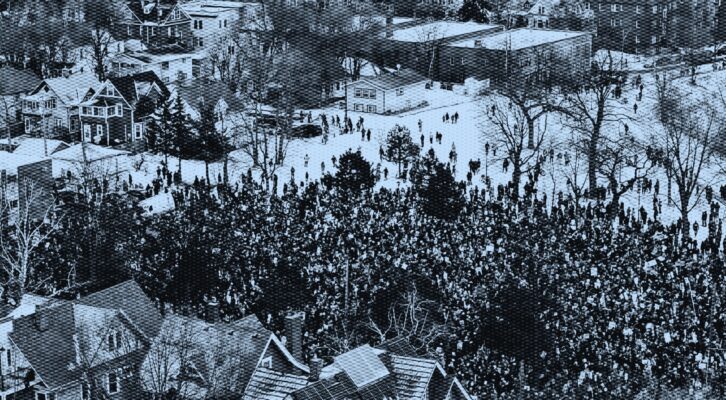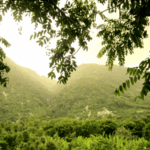Dubai, the largest city of the United Arab Emirates, sits on the Persian Gulf and is the business center of the Middle East. It is a major transit hub for those traveling from West to East (and back the other way), is phenomenally wealthy not from oil (which is actually in limited supply in Dubai compared to its neighbors) but from trade and investment. It is a city of air-conditioned shopping malls and luxury skyscrapers; of Maybachs and Ferraris, and functions on the toil of two million migrant workers—the maids, shop assistants, hotel staff and those who toil at construction jobs in +100° temperatures. Much of the crime writing featuring on Dubai focuses on the incredible wealth gap between these workers and their bosses; those who serve and those who are lucky enough to be served.
Tom Callaghan’s excellent Akyl Borubaev series is concerned mostly with the Bishkek Murder Squad in Kyrgyzstan (see Crime and the City Central Asia). However, in book three of the series, A Summer Revenge (2017), Borubaev heads to Dubai to where the Kyrgyz mistress of a corrupt Bishkek government official has disappeared with information that could destroy the official’s (rather tarnished already it has to be said) reputation. Borubav encounters the multinational world of Dubai’s female sex trafficking—Chinese, Filipino, Russian—and discovers that Dubai is a haven for international criminals of all sorts. You’re as likely to meet an exiled gangster from Central Asia, Moscow, Malaysia, or Bombay at the bar of a five star Dubai hotel as you are a businessman or flight crew on a stopover.
And that’s how most people encounter Dubai—on a few hours stopover at Dubai International Airport. In Chris Bohjalian’s The Flight Attendant (2018), Cassandra Bowden wakes up in a Dubai hotel room with a hangover having blacked out the night before. She’s late for her crew shuttle to the airport and can’t remember much of the previous night’s drinking binge. That is until she sees the dead man in bed next to her. She panics, puts out the DO NOT DISTURB sign, leaves, flies to New York to be met by the FBI who, naturally, have a few questions. Eventually she’ll have to face what actually happened back in Dubai. Did she kill the man in her bed? If so, why? If not, then who did? And who was he anyway?
Back to the airport and Dan Fesperman’s Layover in Dubai (2011) sees Sam, an everyday American, an honest auditor at a pharmaceutical firm, stuck with a six-hour layover in Dubai on the way home. His firm then asks him to hang on in the city for a week to watch over a hard-partying colleague. He reluctantly agrees and wishes he hadn’t when the colleague ends up dead and Sam is accused of his murder. Dodgy Big Pharma and global corporations meet the Dubai underworld while Sam teams up with local detective Anwar Sharaf to work out what really happened.
The super modernity of Dubai, the clinical hotel rooms, chilly cocktail bars high in the sky and, millionaire retail plazas, are the background for Mark Watson’s The Place That Didn’t Exist (2016). An advertising guy on a Dubai shoot for a charity commercial thinks he’s hit the jackpot—glamorous location; decent expenses budget. Then a crew member on the shoot winds up dead. Watson’s murder mystery is dark and twisty, but with a dose of humor (Watson is a stand-up comedian as well as a writer) and this is a gentle mocking of Dubai’s futuristic pretensions.
Long before all the skyscrapers and Rolls Royces, Dubai, while an undeveloped city, was still a crucial entrepôt between Persia (Iran) and the West. Thriller writer Robin Moore wrote about the old sheikdom of Dubai back in the 1970s in his novel Dubai (1976). It’s not great, but if you want a sense of an older, less polished city, then it does have some good descriptive detail. Gold smuggling, Cold War machinations over oil, beautiful women—it’s a period piece, but quite fun.
Margot Milne’s Dubai-based idea is to transfer the classic Agatha Christie style mystery to the modern day city in Air Dogs and Englishmen: A Dubai Mystery (2019). Inspector Marion Lovell is called in to investigate a murder in a luxury hotel to decide which one of the Gucci and Chanel dripping guests did the foul deed.
Abdulla AlQatami is a local author and has published two books in English that are a mix of mystery, crime and sci-fi – Dubai the Jungle (2017) and Dubai the Jungle 2 (2018) The books all take place in Dubai Zoo (the oldest in the Middle East) where the animals are suddenly and inexplicably acting strangely. It’s a somewhat different case for Dubai cops Police Commander Omar and Detective Sultan. Maybe it’s the Dubai mafia stirring up the animals, but why?
And so which other city in the world has a police force whose motor pool includes an Aston Martin One-77, Audi R8, Bentley Continental GT, BMW M6 Gran Coupé, Bugatti Veyron and Chevrolet Camaro SS?As mentioned previously Dubai has acquired something of a reputation as a haven for retired gangsters. Raymond Barrett’s Dubai Dreams: Inside the Kingdom of Bling (2010) juxtaposes the world’s tallest building, largest man-made island, and biggest shopping mall with bordellos, back-alley speakeasies and corrupt cops. As an example of the exiled gangster life S. Hussain Zaidi’s Dongri to Dubai: Six Decades of The Mumbai Mafia (2013) paints a pretty convincing picture of life on the run in Dubai with quite a few million dollars in your pocket. Zaidi specializes in true crime books about the Mumbai Mafia, especially the head of the city’s notorious D-Company, Dawood Ibrahim. Ibrahim rose up though Mumbai’s crime ranks in the 1970s with his reach eventually extending into Pakistan and throughout Bollywood. Forced out of India he relocated to Dubai but continued to be a “Don” (and local real estate king in Dubai), organizing his crew back in Mumbai by cellphone. Quite where Ibrahim is now is unclear—Pakistan probably. His operation was accused by the US of involvement in funding terrorism; Dubai started deportation orders back to India; Ibrahim skipped town with his name on the FBI’s Ten Most Wanted list. It’s probably a reasonably comfortable hiding place as he’s still thought to be worth about US$6.7 billion derived from extortion, drugs, gun running, gold smuggling, and some judicious Dubai real estate deals.
Before the rise of Dubai as a major financial hub it traded a bit of oil from Persia and neighboring sheikdoms, but mostly smuggled gold and pearls. It was always a raffish, piratical sort of place. After all, it’s a port city—a sort of Arabian Marseille— and, back in the old days, was a free port that attracted anyone who didn’t much like taxes and customs duties. Well that’s all gone now—Dubai is home to the global super rich. But maybe the laws are still flouted—one being the penchant of wealthy young men for racing high performance cars around the city in the cooler early hours before dawn. And so which other city in the world has a police force whose motor pool includes an Aston Martin One-77, Audi R8, Bentley Continental GT, BMW M6 Gran Coupé, Bugatti Veyron and Chevrolet Camaro SS? They need them—they say to impress the tourists; but they’re the only cars that can catch Dubai’s night-time boy racers!

















